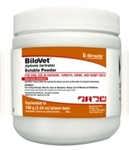Tylosin Soluble Powder
Tylosin Powder is an antibiotic for used in chickens, turkeys, swine and honey bees. In an off label use, it is often given to dogs and cats to prevent tear staining.
Indications
Chickens: As an aid in the treatment of chronic respiratory disease (CRD) caused by Mycoplasma gallisepticum sensitive to tylosin in broiler and replacement chickens. For the control of CRD associated with Mycoplasma gallisepticum sensitive to tylosin at the time of vaccination or other stress in chickens. For the control of CRD associated with Mycoplasma synoviae sensitive to tylosin in broiler chickens.
Turkeys: For maintaining weight gains and feed efficiency in the presence of infectious sinusitis associated with Mycoplasma gallisepticum sensitive to tylosin.
Swine: For the treatment and control of swine dysentery associated with Brachyspira hyodysenteriae . For the treatment and control of swine dysentery associated with Brachyspira hyodysenteriae when followed immediately by TYLOSIN Type A medicated article in feed. For the control of porcine proliferative enteropathies (PPE, ileitis) associated with Lawsonia intracellularis when followed immediately by TYLOSIN Type A medicated article in feed.
Honey Bees: For the control of American Foulbrood (Paenibacillus larvae).
Ingredients: Tylosin tartrate 100g
Mixing Directions
Chickens and Turkeys: To assure thorough dissolution, place the Tylosin (contents of this jar) in a mixing container and add one gallon of water (3790 mL) to the material. Mix this concentrated solution with water to make 50 gallons (189 liters) of treated drinking water.
Swine: To assure thorough dissolution, place the Tylosin (contents of this jar) in a mixing container and add one gallon of water (3790 mL) to the material. Mix this concentrated solution with water to make 400 gallons of treated drinking water resulting in 250 mg/gallon.
Honey Bees: Mix 200 mg tylosin in 20 g confectioners/powdered sugar. Use immediately.
When directed to mix the product with water, always add the water to the powder. Do not pour the powder into the water. Prepare a fresh Tylosin solution every three days. When mixing and handling tylosin, use protective clothing and impervious gloves.
Directions for Use
Chickens should be treated for three days; however, treatment may be administered for one to five days depending upon severity of infection. Treated chickens must consume enough medicated water to provide 50 mg per pound of body weight per day. Only medicated water should be available to the birds.
Turkeys should be treated for three days; however, treatment may be administered for two to five days depending upon severity of infection. Treated turkeys must consume enough medicated water to provide 60 mg per pound of body weight per day. Only medicated water should be available to the birds.
Swine For the treatment and control of swine dysentery medicate with 250 mg tylosin per gallon in drinking water for 3 to 10 days, depending upon severity of infection. Alternatively, medicate with 250 mg tylosin per gallon in drinking water for 3 to 10 days, followed by 40 to 100 g tylosin per ton of complete feed for 2 to 6 weeks. For control of porcine proliferative enteropathies (PPE, ileitis) medicate with 250 mg tylosin per gallon in drinking water for 3 to 10 days, followed by 40 to 100 g of tylosin per ton of complete feed for 2 to 6 weeks. Swine must consume enough medicated water to provide a therapeutic dose. Only medicated water (250 mg tylosin per gallon) should be available while medicating with TYLOSIN Soluble.
Honey Bee colonies should receive three treatments administered as a dust in confectioners/powdered sugar. The 200 mg dose is applied (dusted) over the top bars of the brood chamber once weekly for 3 weeks.
Notice: Organisms vary in their degree of susceptibility to any chemotherapeutic. If no improvement is observed after recommended treatment, diagnosis and susceptibility should be reconfirmed.
NOT FOR HUMAN USE
|
RESIDUE WARNING: Chickens must not be slaughtered for food within 24 hours after treatment. Turkeys must not be slaughtered for food within five days after treatment. Swine must not be slaughtered for food within 48 hours after treatment. Do not use in layers producing eggs for human consumption. Honey Bees: The drug should be fed early in the spring or fall and consumed by the bees before the main honey flow begins, to avoid contamination of production honey. Complete treatments at least 4 weeks prior to main honey flow. |
Avoid contact with human skin. Exposure to tylosin may cause a rash.
Store at Room Temperature, 25°C (77°F). (Excursions Permitted to 40°C). Avoid Moisture.


